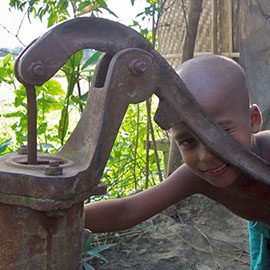Ramboll Takes Part in the Design of a UNICEF Water Safety Program for Bangladesh

Although Bangladesh has made progress towards achieving its goal of access to improved water supply, significant challenges remain in terms of quality and sustainability of the water supply.
About 65% of the population lack access to drinking water that is arsenic safe and free from microbial contamination. Naturally occurring arsenic is widely abundant in Bangladesh groundwater systems and today more than 40 million people are drinking water with arsenic concentrations exceeding WHOs guideline value for drinking water.
The design of the program is done in close collaboration with UNICEF Bangladesh and Royal Institute of Technology (KTH), Sweden. The objective of Ramboll and KTHs mission is to integrate strategies for sustainable arsenic mitigation in an UNICEF Water Safety Program for Bangladesh. The initiative to the program comes from UNICEF and Swedish Sida jointly and UNICEF is aiming at beginning the interventions during 2017. Ramboll Foundation has previously funded a research program on high arsenic groundwater in Bangladesh and part of those results is now integrated in the program.
Responding to water quality challenges
The objective of the program is to support the Government of Bangladesh in responding to the drinking water safety challenges in Bangladesh. The program will seek to respond to the water quality challenges within a water safety and water management framework with the objective of mitigating the negative impacts of water contamination on health.
We are working closely with the UNICEFs water quality and water supply teams to design a program of support with relevant ministries and government institutions and NGOs to strengthen the institutional systems in the public and private water sector.
Because of the magnitude of the problems, sustainable strategies for scaling up safe water access will involve steps to develop capacity at local governmental institutions and to develop capacity of the private sector, which are contributing to 90% of the tubewell installations in the country.


